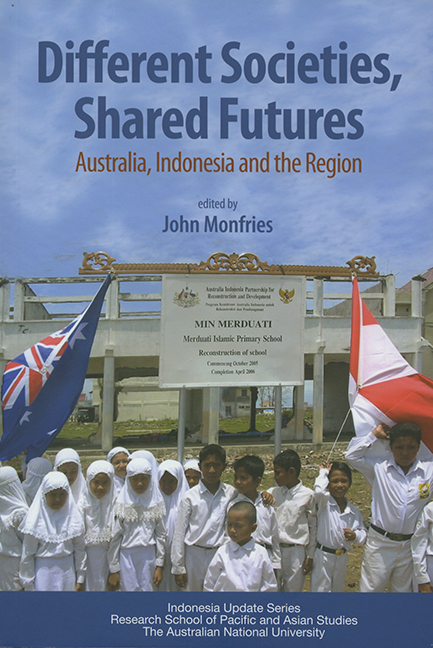Book contents
- Frontmatter
- Dedication
- Contents
- Tables
- Figures
- Contributors
- Acknowledgments
- Opening Address by Richard Woolcott AC
- 1 Introduction
- PART I Regional Viewpoints
- PART II Security Aspects
- PART III Mutual Perceptions and Irritations
- PART IV The Economic Partnership: Aid, Economics and Business
- PART V Conclusion
- Glossary
- References
- Index
Opening Address by Richard Woolcott AC
Published online by Cambridge University Press: 21 October 2015
- Frontmatter
- Dedication
- Contents
- Tables
- Figures
- Contributors
- Acknowledgments
- Opening Address by Richard Woolcott AC
- 1 Introduction
- PART I Regional Viewpoints
- PART II Security Aspects
- PART III Mutual Perceptions and Irritations
- PART IV The Economic Partnership: Aid, Economics and Business
- PART V Conclusion
- Glossary
- References
- Index
Summary
I want to thank the organisers of the 2005 Indonesia Update conference for inviting me to give this address this morning. Although I retired as secretary of the Department of Foreign Affairs and Trade in 1992, I am the founding director of the Asia Society AustralAsia Centre, which has twice hosted President Susilo Bambang Yudhoyono (SBY), and I maintain a close and continuing interest in Indonesia, not least because I have a married daughter and four grandchildren resident in Jakarta.
I would like to start by saying something about the Update itself. I know from the six years I spent representing Australia at the United Nations how agenda items, even those related to important issues, can become routine. I know some Indonesians consider that the Update has become something of a routine, in that it has tended to focus on shortcomings in Indonesian society such as corruption, a weak judicial system and violations of human rights. These are, of course, issues that need to be discussed and dealt with, primarily in Indonesia.
This, the 23rd Update, is, however, the first to deal specifically with the Australia–Indonesia relationship in a regional context. Our focus should be on how to maximise in the future the potential benefits of the relationship, how to reinvigorate it, rather than dwelling on past concerns.
In this forward-looking approach I intend to set out six guidelines, or markers, on how I consider Australians, including the Howard–Costello–Vaile government and the Opposition, should handle the relationship in the future.
The first and most obvious point is that Indonesia, a resource-rich nation of some 220 million people, consisting of a necklace of 13,600 islands stretching across our northern approaches and astride our main air and sea lanes, must always be a country of paramount importance to Australia. While there is a great focus at present in government, academic and media circles in this country on the opportunities for Australia provided by the booming economies of China and India, on the resurgence of the Japanese economy and on the established relationship with the United States, it would be foolish if Australians were to downplay the opportunities and potential offered by our immediate northern neighbour, as we did in the late 1990s.
Information
- Type
- Chapter
- Information
- Different Societies, Shared FuturesAustralia, Indonesia and the Region, pp. xvii - xxiiPublisher: ISEAS–Yusof Ishak InstitutePrint publication year: 2006
